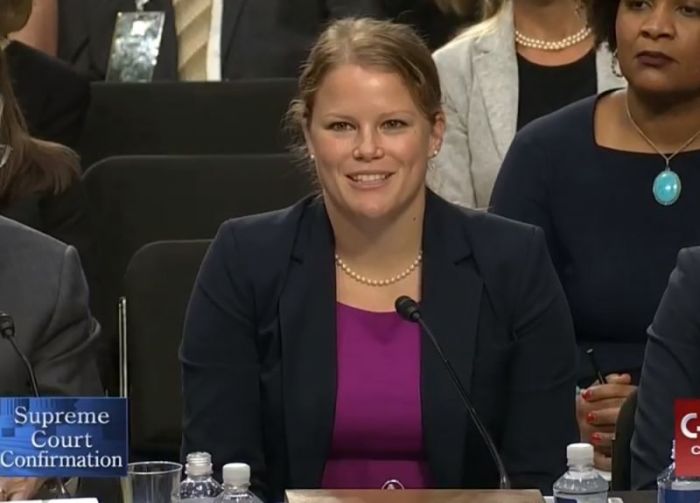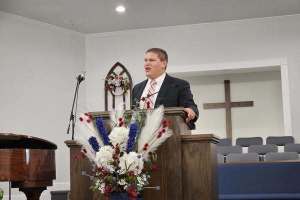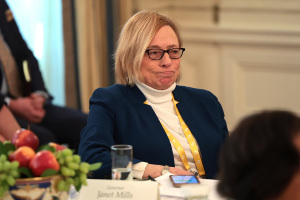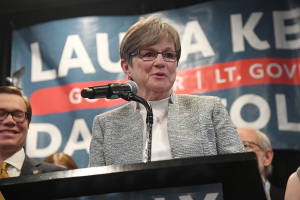Planned Parenthood Hails Pastor Who Cited Bible in Testimony Against Brett Kavanaugh

Abortion rights groups are hailing the testimony of an Indiana minister who spoke against Judge Brett Kavanaugh's nomination to the U.S. Supreme Court on Friday.
Speaking before the Senate Judiciary Committee, Alicia Baker, an ordained Free Methodist Church minister from Indianapolis who's now a community development organizer, asserted in her testimony that if Kavanaugh — who was nominated by President Donald Trump in July to replace retired Justice Anthony Kennedy — is confirmed to the Supreme Court, she "fears" that women who can least afford birth control won't "get access to affordable birth control because of their employers' religious beliefs."
"Birth control allows women and people to control their lives. And without it, women's health and their futures are at risk," Baker said at the hearing, noting that she and her husband were relieved that the Affordable Care Act requires plans to cover birth control at no cost to us."
In her testimony to the committee, Baker cited several scriptures to support her position, among them being: Proverbs 31:8-9, Micah 6:8, Matthew 22:37–40, and John 10:10.
"Jesus directs us to advocate for a just society that allows people to live their lives to the fullest. In John 10:10, Jesus says, 'I have come that you might have life, and have it to the full.' ... And this means supporting access to affordable birth control, because by permitting individuals to plan if, whether, and when to become pregnant, birth control allows us to live our fullest lives," Baker said, in part, in her written testimony to the committee.
Baker explained that she and her husband abstained from sex until marriage and before her wedding day she decided to obtain birth control and chose to have a hormone-free IUD that can last up to 12 years. The birth control option she chose cost $1,200.
She had expected her Christian insurance provider to cover the cost of the IUD but they did not. She was later informed that the insurance provider has a religious exemption to opt-out of covering surgical abortions, abortion-inducing drugs and certain types of birth control.
"I was shocked when, a few weeks before my wedding, I received an explanation of benefits in the mail telling me that my IUD was not covered by my insurance, and that I would have to pay $1,200 out of pocket. ... Guidestone pointed to an exception in the plan document specifying that 'GuideStone does not provide coverage for abortions or abortion-causing drugs, as this violates our biblical convictions on sanctity of life,'" Baker added in her testimony to the committee. She further asserted that an IUD "is a form of birth control that prevents pregnancy; it does not terminate pregnancy."
Live Action noted, however, that "while implanted birth control has a reputation for being much more effective than other types of birth control, ... Abortion numbers for women using IUDs are on the rise."
"A recent study published in the journal Contraception ... found that there was a 'statistically significant increase' in the number of abortion patients who reported using long-acting reversible birth control such as an IUD during the month they became pregnant," Live Action reported.
Baker said that instead of enjoying the first months of marriage, she felt stressed and suffered anxiety over having to submit appeals to her insurance company, which she described as a "nightmare" experience. Baker eventually paid for her birth control, she said, by using money originally set aside to pay for student loans and toward a down payment on a house.
"For those who already face increased obstacles to health care, including people of color, LGBT people, young people, and people with lower incomes, a $1,200 bill would only exacerbate existing disparities."
In her testimony she referenced Kavanaugh's opinion that the federal government cannot compel Christian organizations to provide coverage for some forms of birth control and abortion-inducing drugs.
Employers that citied religious objections in challenging the Obamacare HHS mandate that they provide birth control that could induce an abortion include Hobby Lobby, Little Sisters of the Poor and Christian colleges.
"As a Christian, I am against such broad interpretations of religious freedom," Baker said. "It is not right that employers may be able to use religion to avoid following the laws of the land."
She later added: "My religious beliefs are separate from the law, and that's how it should be. But Judge Kavanaugh's record shows he does not respect this critical separation." The quote was later tweeted by Planned Parenthood Action Fund with the hashtag #StopKavanaugh.
Baker's comments were also shared by other pro-choice group such as NARAL, the Center for Reproductive Rights, the National Women's Law Center, along with far-left activist groups.
In a counter argument to Baker's testimony, the Radiance Foundation tweeted: Dear Alicia Baker, there's no constitutional right to subsidized birth control, though anyone can get taxpayer-funded BC at 13,000+ federal/community health centers (http://GetYourCare.org ). There's a reason #ReligiousFreedom is listed as the very first right. #ConfirmKavanaugh."
Baker said the situation she and her husband faced was similar to a case heard by Kavanaugh who sits on the U.S. Court of Appeals for the District of Columbia Circuit. In that case, Priests for Life et al. v. United States Department of Health and Human Services, Kavanaugh wrote a dissenting opinion against the court's decision to reject Priests for Life's petition for an appeal.
"In 2015, Judge Kavanaugh split with other judges on his court and wrote a dissenting opinion in the case Priests for Life that would have allowed employers and universities to use religion to deny birth control coverage to individuals," she said in her written testimony.
Kavanaugh explained at Thursday's hearing why he supported Priests for Life's argument that the Obamacare HHS preventive services mandate violated their religious liberty.
"Under the Religious Freedom Restoration Act, the question was first was this a substantial burden on their religious exercise, and it seemed to me quite clearly it was," said Kavanaugh.
"It was a technical matter of filling out a form in that case, but they said filling out a form would make them complicit in the provision of the abortion-inducing drugs they were, as a religious manner, objected to."
Kavanaugh noted that it "seemed to me that the government had avenues to ensure that the coverage was provided without doing so on the backs of the religious objectors."
The judge added that "religious liberty protects all of us" and went on to note the value of the federal Religious Freedom Restoration Act, calling it "an important addition to the protection of religious freedom in the United States, to supplement the constitutional protections that exists in the Free Exercise Clause."
"And as I have said in some of my opinions, we're all equally American no matter what religion we are or no religion at all," Kavanaugh added.
Follow Melissa Barnhart on Twitter: @MelBarnhart





























